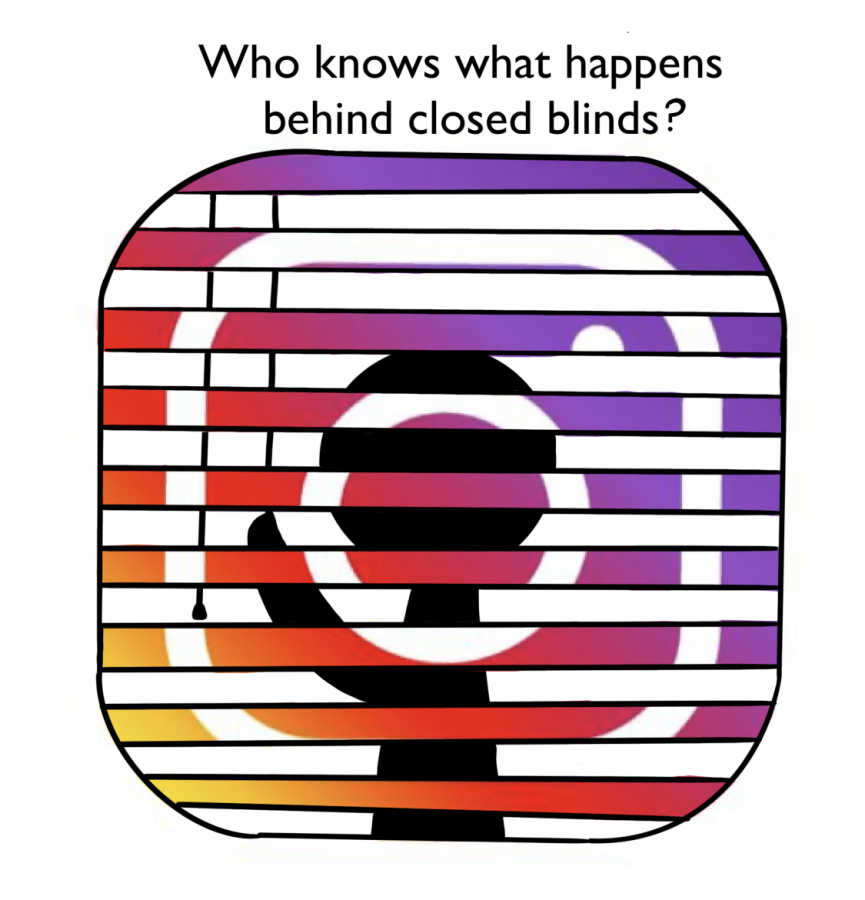Getting real with fake social media accounts
Hidden users fall victim to washed over hot top issues
Cartoon by: Bailey Christensen
In recent years the creation of “Sinstas” has allowed teenagers to post their true feelings without facing the common consequences and social standards that plague public accounts.
February 20, 2020
A term created within the past couple of years, “Sinsta,” stands foreign to those naive of the depths of the social media app Instagram. A combination of the words “secret” and “insta”, “Sinstas,” are a pool of teenagers posting the reality of how it feels to be a teen in a world bound by the strings of societal norms.
Teens started turning towards hidden accounts after the pressure of posting on a main account seemed too lifeless with the necessity of always being picture-perfect. Personal social media accounts scream out to the world “This is me” which led to the idea that each photo posted must be Vogue-worthy, that each comment must display only joy and happiness and that everyone’s account must be flawless as society standards want it to be. Through the tough teenage years of development, the last thing a teen needs is the stress of perfection, which over time can then lead to the development of mental issues.
A survey conducted by the Royal Society for Public Health asked teens and young adults ranging from 14-24 years old how social media platforms impacted their health and wellbeing. Results from the survey showed that Snapchat, Facebook, Twitter and Instagram all led to increased feelings of depression, anxiety, poor body image and loneliness.
Masking emotion has become a professional skill obtained by today’s youth thanks to society’s stigmas about mental health. However, with the outlets of social media and the creation of secret accounts, students are ripping off their masks and releasing true feelings that people are too afraid to show unless it is hidden behind a screen. Ironically, this is then sent out in the depths of the internet to stay.
While teens find this a useful way to destress, it only is feeding the flames. The creation of a secret world is ultimately a web of fake support, deception and a driving catalyst towards other issues such as child pornography. A secret account lives mainly off three things, attention, emotional ranting and the craving for gossip.
Nowadays having an Instagram account or any social media platform, does not quite satisfy the teen hunger for comments, likes and recognition. According to Psychology Today, the main reason people seek attention is due to low self-esteem, which ultimately forms at the hands of society and being put in comparison to others. Secret accounts are the breeding grounds of terrible self-confidence.
This is leading to terrible choices played out by minors and young adults seeking attention in the aspect of appearance. Unfortunately, I can barely open my own phone in public due to the open nudity kids my age are posting on their “Sinstas”. Maybe they want to increase their confidence through likes and comments, or maybe they are content with their appearance and just want to show it, but nonetheless it is considered child pornography.
These sorts of pictures can easily be screenshotted and sent within half a second. While you’d never find this on someone’s main account, teens assume that since it is private it can not spread or get leaked which is completely and utterly false.
According to StopBulying.gov in January 2009, a survey of 1200 teenagers reported that one in five had sent or publically posted explicit photos of themselves. In 2007, 32 Victoria teenagers were prosecuted as a result of sexting activity. Child pornography charges were also brought against six teenagers in Greensburg, Pennsylvania, after having such photos online which then circulated on cellphones leading to first degree misdemeanors. There are 1000s of cases similar to these on how the posting of these images only worsens the explicit photo epidemic.
This also creates a huge conflict in relationships. How should one be able to trust a significant other if they follow a person of the opposite sex who posts these provocative photos, even if they are just a friend? “Sinstas,” have simply normalized such pictures to the point where it doesn’t seem to affect anyone anymore. It should seem insane that I can find pictures of around 25% of people within my class that wouldn’t want to be brought into the daylight. The fact that this is becoming common and unspoken of baffles me completely.
On the less extreme side of the spectrum, people also seek attention on “Sinstas,” through posting their most personal problems for everyone to see. I hate to say it but no one seems to truly care about the roller coaster of emotions you’ve gone through for the day, especially when it is basic human problems. It creates a general bad habit of believing that one’s own issues are the biggest concern and that they need someone to give them attention, to coddle them and tell them it will be okay. To myself, that’s just completely annoying and pointless.
Attention seekers have also purely lied on “Sinstas,” just to gain support. Within my first year of high school, a friend of mine went to a counselor based on a post she encountered that was claiming parental abuse. After long legal matters, the person who cried wolf explained it was a complete sham and a cry for attention that almost cost her parents jobs and reputation. This is then drowning out the true cries for help people are posting.
The last way people seek attention is through bullying. In fact, according to a British anti-bullying group, Ditch the Label, the majority of cyberbullying kids experience takes place on Instagram. Obtaining a hidden account allows users to troll, upset people on the internet, without having their name publicly announced.
Moving on to emotional baggage, “Sinstas,’ have it all ranging from parents, school stress and your average basket full of mental health issues.
When scrolling through my feed, I see an abundance of paragraph typers who make their daily diary entry for all of their followers to see. While I am all for venting, it’s becoming an issue of crossing the line of healthy ranting to self-degrading.
People should not be publicly displaying all of their emotions for anyone who follows them. If you’re struggling to breathe under the crushing weight of your emotions, find a trusted friend or counselor to talk to and practice dealing with your feelings before going public with them and completely scaring everyone on the internet. It’s one thing to be honest about a bad day, but true friends should know how you are doing without having to read it on their feed.
Not only is this a bad habit, but once it is done the outcome is usually very underwhelming. Everyone with a secret account has become numb to sappy rants to the point where we don’t seem to question someone posting about how they “don’t want to live anymore”. I’m terrified one day that someone who posts such things won’t be there the next day and we all just assumed it was nothing.
People usually comment at first, but after the weeks roll by of the same paragraphs, people lose interest and grow tired of trying to fix something that keeps seeming to break.
Is this healthy for anyone? Absolutely not. It is a terrible support system that leaves those who need some sort of outlet at a loss.
My last main issue is the concept. A secret account means it must be secret, yet most people with these accounts follow strangers who post the same type of content. Some “Sinstas,” range above 100 followers. Imagine 100 people whom only half you know who can see your deepest feelings, your daily rants, your private pictures and just a closer insight into the true you.
Now the question pops up of how to get rid of these accounts and the biggest kicker is it hard to accomplish. Teenagers, whether they like to admit it or not, love gossip that is not theirs. “Sinstas,” are a library of rumors and stories to share that one may feel no longer included in if they get rid of their account. I would honestly consider it a type of addiction.
Overall, society has taken the developing youth and turned it into having to create a fake account that strikes more truth than anything else you can find on the internet. Teens are sheltering their feelings and emotions only to be expressed in a toxic environment that provides no support.







